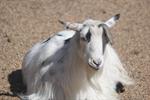Permaculture Goats
 Goats can be kept for meat, milk or fibre production. They can supply meat, control weeds and be used to manage waste (e.g. goats love many kitchen food scraps such as fruit and vegetable peelings).
Goats can be kept for meat, milk or fibre production. They can supply meat, control weeds and be used to manage waste (e.g. goats love many kitchen food scraps such as fruit and vegetable peelings).
Younger goats, although lighter in weight, can provide more tender meat. Older goats can contain too much fat for the human pallet. Meat can be obtained from all breeds - fibre, dairy, feral and boer goats.
Goat milk can be used for specialised cheese making. A good knowledge of animal nutrition, lactation and disease control is essential for milk production. Additional knowledge of pasture management will aid in increased productivity. The main dairy breeds include Saanen, British alpine and Toggenburg. Crossbreeds of these have been used in recent years in many countries.
The use of all chemicals should be monitored. The withholding period of the chemical should be adhered to explicitly for meat and dairy goats.
Milking sheds are set up like cow dairies. Infrastructure and machines may be expensive to set up, but are easily run. Milk lactation lasts for 300 days with an average 2-3 l/doe/day. Milk production after kiddling can be significantly higher, but this can vary substantially, as can the reduction in milk production after this.
Mohair and cashmere is one sector of the goat industry that has internationally established markets for the fibres. The demand for quality fibre is beyond the present supply capacity. Prices for Cashmere may vary considerably from Mohair fibre is regarded as high quality and frequently used in luxury clothing. Fibre price is dependent on fibre diameter, length and occurrence of colour. Kid mohair generally receives a higher price compared to the coarser adult fibre. Shearing is carried out twice a year when length exceeds 10cm.
Cashmere goats (so named after the region in India, now more commonly known as Kashmir) produce a coarse low value fleece, but have an under coat of fine high quality down - it is this down which is called cashmere. This is very light and much warmer than sheep's wool. It is a very valuable commodity and the price obtained is generally governed by colour and fibre diameter. Shearing is carried out once a year.
Mohair fibre is normally sold to make yarns, rugs, knitwear and velours. All goats have the benefit of consuming weeds species thereby reducing the weed population on the property and the ability to utilise steep slopes where other animals are less likely to graze. However, vegetable matter (VM) content in the fibre will lower the value of the mohair.
Goats tend to be healthiest in dry to semi-arid districts where winter rainfall is not high - these districts tend to increase problems of parasites. Goats are often susceptible to soil trace-element deficiencies, and a range of diseases, including Johnes disease and Caprine retovirus (CAE). Goats need strong fencing, so initial fencing costs may be expensive, however, electrified fences tend to be cheaper in set up and more effective in goat control.
To enter into goat production, it is advisable to first fully research the topic. Try to observe other goat farm operations, ensure suitable fencing is constructed, and start with a small number of head before expanding to full production. Purchase the right equipment but understand that there may be some specialist equipment which you will need to employ. That is most often for drenching, shearing or castrating. Stocking rates are similar to that of sheep, and good pasture husbandry will increase productivity.
Keeping Goats
If you are looking to keep goats as part of a self-sufficient way of life, or as part of a permaculture system you may be interested in our Goat Husbandry course or our Animals In Permaculture Systems course.
All of our courses are studied by distance learning and can be started at any time. They are taught by highly knowledgeable expert tutors. Although students study by distance learning, they have access to our tutors by email or phone, and our courses include practical elements to reinforce the learning process.
If you have any questions or would like to know more about studying with ACS, please get in touch with our Permaculture and Self-Sufficiency tutors today. They will be pleased to answer your questions and discuss your study goals.
[31/12/2025 23:42:03]
More from ACS
This courses includes the PDC (Permaculture Design Certificate); and more.